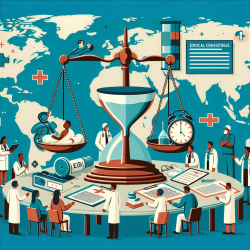In the wake of the COVID-19 pandemic, the importance of conducting high-quality research during public health emergencies (PHEs) has come to the forefront. The research article "The Ethical Obligation for Research During Public Health Emergencies: Insights From the COVID-19 Pandemic" highlights this necessity. It argues that well-designed randomized trials are not only permissible but ethically obligatory before, during, and after implementing policies in PHEs.
Understanding Equipoise in Public Health
The concept of equipoise refers to a situation of uncertainty or disagreement among experts about an intervention's evidence. In public health emergencies, this uncertainty becomes more pronounced as policymakers face pressure to act swiftly. However, without high-quality research, interventions may be implemented based on fragile evidence, potentially causing more harm than good.
The Role of Randomized Trials
Randomized controlled trials (RCTs) are essential for establishing the causal efficacy and effectiveness of interventions. The COVID-19 pandemic exposed a reliance on observational data over RCTs, leading to policies that were sometimes based on insufficient evidence. The ethical obligation to conduct rigorous studies ensures that interventions are beneficial and minimizes the risk of implementing harmful policies.
Encouraging Further Research
Practitioners are encouraged to engage in further research to improve their skills and contribute to evidence-based policymaking. By participating in or advocating for high-quality research, practitioners can help ensure that public health interventions are grounded in solid evidence. This approach not only enhances transparency and accountability but also allows for the redirection of resources towards more effective solutions.
A Call for Policy Reform
The article proposes a reform in public health policy: whenever a policy implemented during a PHE lacks high-quality evidence, there should be a planned approach to generate such evidence. This includes reviewing emerging data at preset time points to determine whether policies should continue or be revised. This reform aims to improve transparency and accountability in public health decision-making.
To read the original research paper, please follow this link: The Ethical Obligation for Research During Public Health Emergencies: Insights From the COVID-19 Pandemic.










